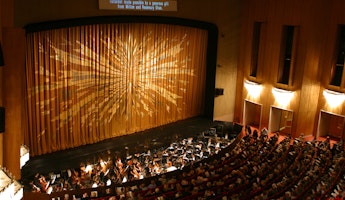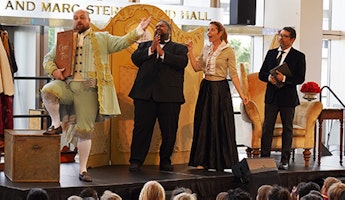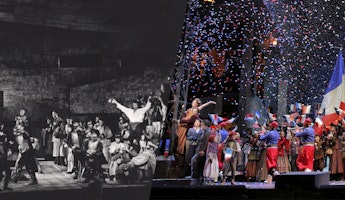Blog
August 3, 2023
John Adams' Opera Forerunner to "Oppenheimer"
Last month saw the release of Christopher Nolan’s Oppenheimer. The film follows J. Robert Oppenheimer, from his college years to the Trinity test to his 1954 security hearing. In the two weeks that it’s been out, Oppenheimer has become a huge box office hit, with many people online discussing the movie and delving into the history of the atomic age. We loved Nolan’s complex portrayal of Oppenheimer, and couldn’t help but weigh it against the stage depiction in John Adams’ Doctor Atomic. The opera (which premiered in 2005 at San Francisco Opera and had a major revival at the Metropolitan Opera a few years later) touches on similar story beats and themes that Oppenheimer would tackle seventeen years later. By examining these works side by side, we can see how stories overlap and diverge onstage and onscreen.
The first thing that truly surprised us about Oppenheimer was how musical the movie was. Not in the sense of people breaking out into song, but the whole film felt as if Nolan directed and edited it around Ludwig Goransson’s soundtrack score. Doctor Atomic is musical too, of course, given that it’s an opera, and there are similar techniques used by both Adams and Goransson to create the dread of a bomb about to go off: staccato (short, jumpy) notes heighten adrenaline and evoke an ever-ticking timepiece; furious orchestrations echo the destructive power of humans and nature; and taut stretches of silence that allow the audience to grasp the enormity of the subject matter.
The complex musicality amplifies the immense existential dread and anxiety that comes from developing an unprecedented weapon. Doctor Atomic does this incredibly well: one standout is Oppenheimer’s aria “Batter my heart, three-person'd God,” which captures agonized regret with all the grandiosity that you would expect from an opera.
Where Oppenheimer and Doctor Atomic start to differ is in scope. While both the film and opera understandably focus on the titular character, the film spends a large chunk of time on Oppenheimer’s career prior to the Manhattan Project, as well as his security hearings that took place following the project’s success. Doctor Atomic centers on the Trinity test, with not much focus on the before or after. The Trinity test is still present in Oppenheimer, and in fact contains the film’s largest set piece, but the three-hour run time lends itself more to capturing a moment in history rather than the mind of one man. Certain characters are also given new facets, most notably Oppenheimer’s wife Kitty, whose loving but lonely operatic portrayal stands apart from Emily Blunt’s hardened film interpretation—though both are clearly seen to grieve their husband’s actions.
While certain details differ, the plot points and themes can’t help but overlap. For instance, Oppenheimer’s personal politics inevitably come into play: he was involved with communist movements in his youth and was ideologically at odds with the very governmental forces that relied on him to deliver the bomb. His career was a highly political one, so naturally his own politics are a focal point in any adaptations. In Nolan’s Oppenheimer, we see him actively struggle to retain and express his beliefs, though the struggle is more subdued in Doctor Atomic, since this is an Oppenheimer who has already been subsumed into the U.S. Army. The push-pull between his beliefs and his work ground Oppenheimer’s story, as does the dynamic between state-inflicted or self-inflicted censorship.
Another major theme in both works is the atomic age engulfing the world in a sea of fire. This was a very real worry leading up to the Trinity test, so of course both adaptations find a way to fit it in, expressed in the way that plays to each medium’s strengths. Oppenheimer relies on incisive dialogue and incredible visuals, while Doctor Atomic creates a bleak atmosphere through haunting, poetic lyrics and staging. Both use this theme to build up to stunning endings (which we would be ashamed to spoil).
Opera is similar to cinema when it comes to capturing a morally fraught and existential story, with the addition of world-class singing and innovative staging. In fact, Margaret Atwood (author and librettist of The Handmaid’s Tale) once said that opera, not theater, was the precursor to movies. This is not to say one medium is better than the other, simply that opera has a range that goes beyond comedies or star-crossed lovers. We hope to have interested you in Adam’s monumental Doctor Atomic—and if you loved Goransson’s Oppenheimer score, there are many operas that deliver the same rush. Who knows, maybe the next box office hit is already being performed on stage.








/03-cosi/_dsc0996_pr.jpg?format=auto&fit=crop&w=345&h=200&auto=format)















